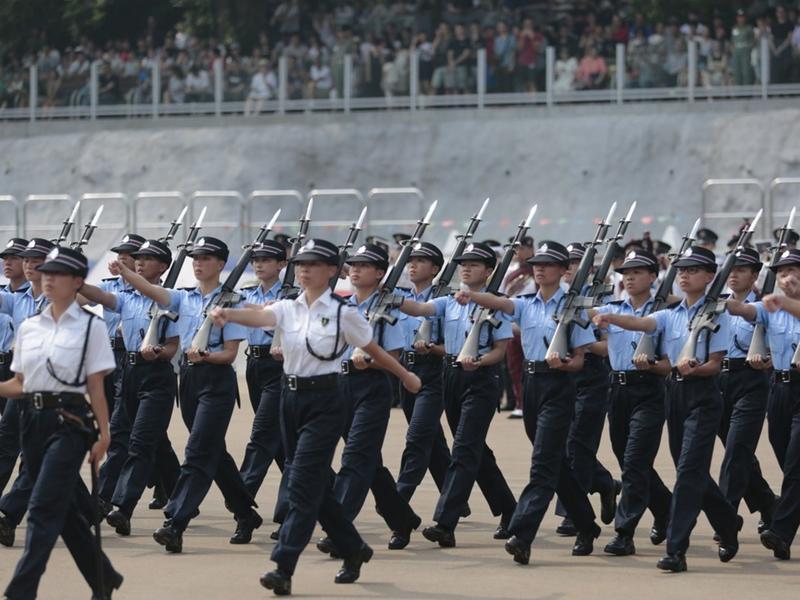 Police Commissioner Chris Tang Ping-keung believe there are committed people who are willing to safeguard law and order in Hong Kong. Yet it is a challenge because they may be afraid that their family members will be doxxed if they join the police. (PHOTO PROVIDED TO CHINA DAILY)
Police Commissioner Chris Tang Ping-keung believe there are committed people who are willing to safeguard law and order in Hong Kong. Yet it is a challenge because they may be afraid that their family members will be doxxed if they join the police. (PHOTO PROVIDED TO CHINA DAILY)
Police Commissioner Chris Tang Ping-keung said it is challenging to recruit 2,500 police officers for the Hong Kong Police Force in this financial year (2020-21) as the police face high risks of personal information leak.
“I believe there are committed people who are willing to safeguard law and order in Hong Kong. Yet it is a challenge because they may be afraid that their family members will be doxxed if they join the police,” Tang said.
With greater manpower, we can enhance patrolling in various districts. We can also strengthen the Police Tactical Unit for handling public events and emergencies. When there are not many public activities and emergencies, the PTU officers can be deployed to patrolling duties
Chris Tang Ping-keung, Hong Kong police commissioner
“We have to wait and see the response and the number of applicants, but I was glad that the application for auxiliary police officers surged by 70 percent last year,” he added.
According to the official data, the total number of police officers in the city will reach at least 38,400 in this fiscal year, a 7 percent increase from the current 35,863. The proposed growth is also expected to address the surge of crime cases amid strained police manpower.
“I think without additional manpower, it will be a big challenge for us. You can see what happened in the past nine months. It may end up with the same situation in which our officers need to work very long hours,” Tang said.
In 2019, the city’s overall number of crimes took a drastic turn after 12 consecutive years of decline, when it rose by 9.2 percent to 59,225 cases from 54,225 cases in 2018. It was a tough year for the law enforcement force, dubbed “Asia’s finest”, especially since June, when the months-long street violence triggered by the since-withdrawn extradition bill began.
Apart from the incessant street violence since June, police manpower was also strained by the increase in crime reports — a byproduct of the nonstop violence inflicted by rampaging anti-government radicals.
The police in a statement on March 2 indicated that a surge in crimes such as robberies, burglaries, snatchings, and thefts from vehicles was linked to the fact that “criminals were taking advantage of the thinning out of crime prevention work and resources to cope with related public order events”.
“After the illegal ‘Occupy Central’ campaign in 2014, the number of applicants dropped a bit, but it went back to normal fairly quickly. In recent recruitment exercises, we could choose one inspector from about 40 applicants and one constable from 10 applicants.”
The increase of manpower was part of the police’s proposal for budget surging in this financial year, which stands at HK$25.8 billion (US$3.32 billion), up HK$2.2 billion from its previous year.
Explaining the budget hike, Tang said the new resources will cover payroll for proposed new hires in light of long-standing overtime of many officers during the social unrest.
Also, expenditures are planned for maintenance and renovation of police stations because such resources were used to handle the chaos last year.
“With more police officers, there will be little need for overtime work, and we can accordingly reduce the overtime allowance from HK$2.5 billion to HK$200 million to $300 million. During those days, most officers worked 15 hours instead of the normal nine-hour shift.
“With greater manpower, we can enhance patrolling in various districts. We can also strengthen the Police Tactical Unit for handling public events and emergencies. When there are not many public activities and emergencies, the PTU officers can be deployed to patrolling duties.”
Some people from the opposition camp have doubted the police hiring goal, saying it might be too “optimistic”. Tang, however, said such remarks are aimed at undermining police morale, but the police will not yield.
“I notice that lawbreakers, people who want to break the law, and those who condone the lawbreakers have used whatever means to target police and obstruct our annual pay raise. They have one and only one intent — to defeat police morale. I want to tell them that we police officers are very united and will rise to difficult occasions,” Tang said.
The 2019-20 police pay adjustment, being part and parcel of the civil service pay-raise package, was passed last month only after filibustering by the opposition lawmakers. They demanded the police commissioner attend the Financial Committee meeting and also the committee have separate votes, but such unconventional demands were vetoed by the pro-establishment camp.
“It would be perfectly OK for me if it was the government policy for me to attend the FC meeting and talk about the pay raise,” said Tang, adding he will accompany Security Secretary John Lee Ka-chiu and heads of other disciplined forces to answer questions on the new budget at the Financial Committee meeting next month.


